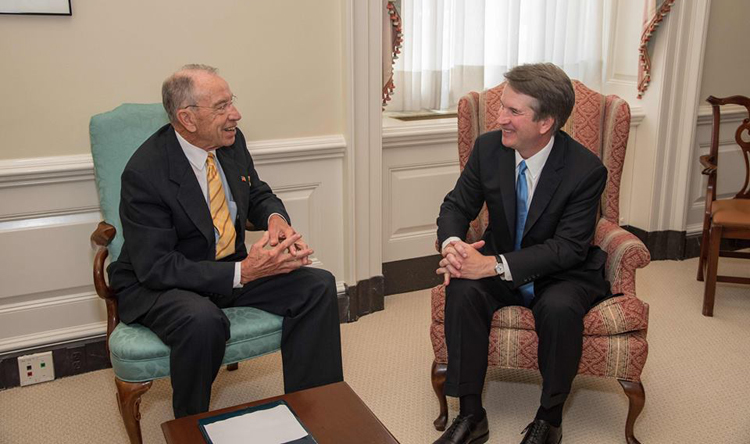Grassley refers Avenatti and client to DOJ for criminal investigation over Kavanaugh accusations

Senate Judiciary Committee Chairman Chuck Grassley meets with then-Supreme Court nominee Brett Kavanaugh on July 12./Office of Sen. Chuck Grassley, R-Iowa, via Wikimedia Commons.
A woman who accused Brett Kavanaugh of attending parties where gang rapes occurred has been referred to the Department of Justice for a criminal investigation along with the lawyer who represents her, Michael Avenatti.
Senate Judiciary Committee Chairman Charles Grassley, an Iowa Republican, made the referral in a letter on Thursday, according to a press release. The Washington Post, ABC, Politico and the Hill are among the publications with coverage.
Avenatti and his client, Julie Swetnick, submitted statements to the committee that “likely contained materially false claims,” Grassley wrote in the letter, addressed to Attorney General Jeff Sessions and FBI Director Christopher Wray.
Avenatti, who is known for his representation of adult film actress Stormy Daniels, said in a tweet that “We welcome the investigation as now we can finally get to the bottom of Judge Kavanaugh’s lies and conduct.”
Kavanaugh was confirmed to the Supreme Court on Oct. 6 following committee testimony by another woman, Christine Blasey Ford, who said Kavanaugh sexually assaulted her at a party when both were high school students.
Swetnick made her allegations in a sworn statement to the committee on Sept. 26. She alleged that she attended house parties in the early 1980s where Kavanaugh was present. Swetnick said she was aware of efforts by Kavanaugh and others to spike the punch with drugs or grain alcohol, so girls would lose their inhibitions and their ability to say no.
Swetnick also said she recalled seeing boys lined up outside rooms for their turn with girls, and she recalls seeing Kavanaugh in line.
In his letter, Grassley said the Senate Judiciary Committee staff began an immediate investigation of Swetnick’s allegations, “diverting significant resources to the effort.” Kavanaugh was questioned about the allegations in transcribed interviews on Sept. 25 and 26, and he “categorically denied the allegations,” Grassley said. The committee also interviewed 10 of Swetnick’s associates.
Avenatti refused to allow committee staff to interview Swetnick.
Later, in an NBC News interview, Swetnick contradicted her claims to the committee, Grassley said. Swetnick said she didn’t know what Kavanaugh did in regard to spiking punch, although she saw him “giving red Solo cups to quite a few girls.” She also said she had no specific knowledge of gang rapes by boys who were huddled outside rooms.
After the “media hubbub” over Swetnick’s contradictory NBC interview, Avenatti “produced a vague and anonymous declaration he claimed supported her allegations,” Grassley said. Avenatti didn’t reveal the person’s identity or make them available for interviews. Avenatti “apparently has a history of claiming to have anonymous clients who never materialize in any verifiable form,” Grassley said.
Grassley said there is no credible evidence that Swetnick ever met or socialized with Kavanaugh, and committee investigators were unable to corroborate Swetnick’s claims. “On the contrary,” he wrote, “they received substantial information calling into question her credibility.”
One former boyfriend said Swetnick had “harassed and stalked” him after their breakup, threatened to murder him, and threatened to falsely accuse him of rape.
Grassley also cited evidence that Swetnick had made false allegations of sexual harassment at previous companies where she worked.
When individuals intentionally mislead the committee, they divert committee resources and materially impede its work, Grassley said.
“It is illegal to knowingly and willfully make materially false, fictitious or fraudulent statements to congressional investigators,” Grassley wrote. “It is illegal to obstruct committee investigations. It is illegal to conspire to do either of those things. When charlatans make false claims to the committee—claims that may earn them short-term media exposure and financial gain but which hinder the committee’s ability to do its job—there should be consequences.”



